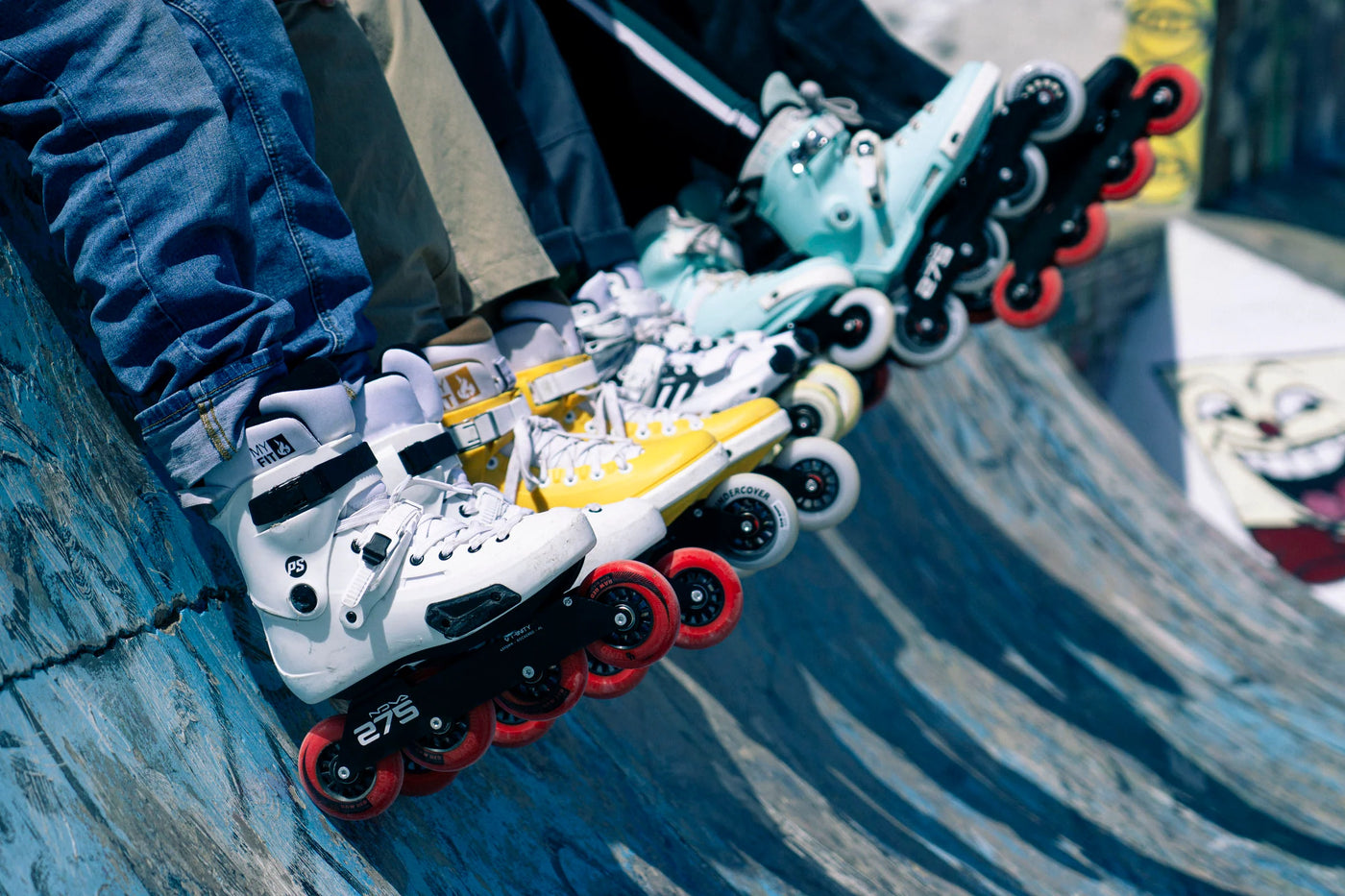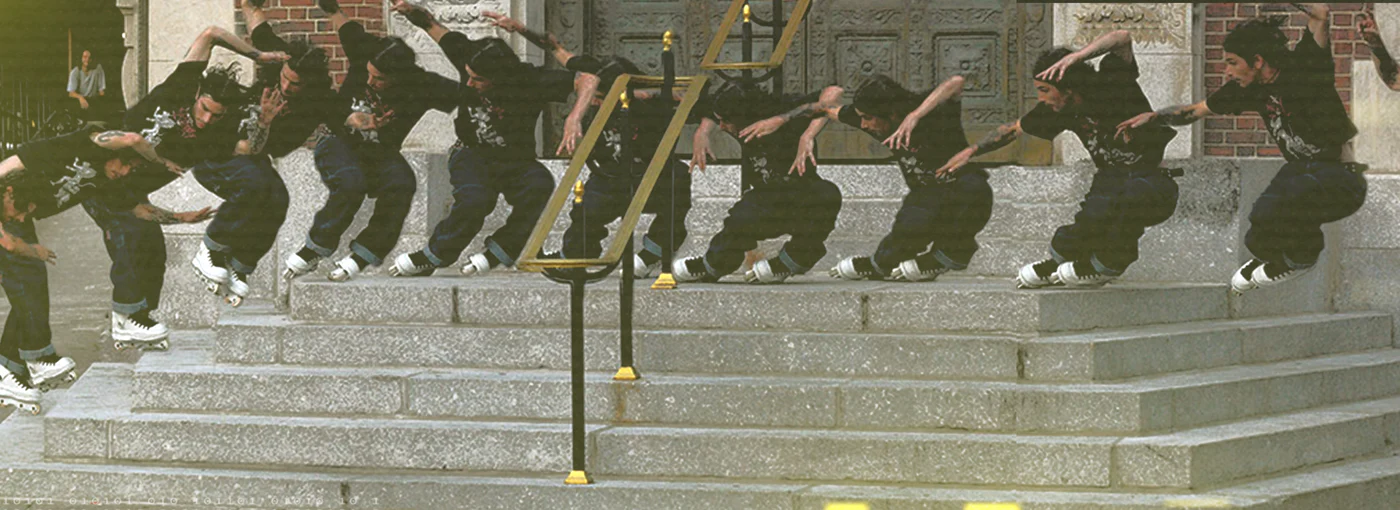
Freeskate and Urban Inline Skates
Latest Models from Top Brands
Whether you're a fan of the classic 4x80 setup or you're into the latest frame configurations, we've got something for everyone. With a variety of colors, designs, and price points, you're sure to find your perfect pair to cruise the city in style.
URBAN SEGMENT

HELMETS & PROTECTIONS
Better skate protected! but you don't need to sacrifice style.

AGGRESSIVE SEGMENT
All about our brands of aggressive.
Mesmer, USD, IQON, Gawds, Kizer
Do you have any question?
We are happy to help you in the web chat but we've also collected the FAQs
FAQs about Frames
Everything you need to know about skate frames
-
What is the importance of frame length in inline skating?

-
Frame length significantly affects your skating stability and agility. Longer frames provide more stability, especially at high speeds, and allow for a stronger push and longer stride, making them ideal for marathon and downhill skating. Shorter frames, on the other hand, are lighter and more agile, offering faster push-offs and shorter strides, which are preferred for urban and slalom skating. More info here 2_2_Frame_Guide.pdf
-
How do I adjust the pitch and deck height of my skate frame?

-
The pitch is the difference in height between the front and rear of the frame. Adjusting the pitch and deck height can impact your stability and edge control. A lower deck height provides more stability, while a higher deck offers more maneuverability. More info here 2_2_Frame_Guide.pdf
-
What is the TRINITY mounting system, and how does it benefit my skating?

-
The TRINITY mounting system is a three-point mounting standard designed to lower the center of gravity, enhance power transfer, and improve control and balance. This system also allows for side-to-side adjustments, helping skaters customize their frame position for optimal performance. More info here 1_8_The_Trinity_story_guide.pdf
-
How do I adjust the alignment of my skate frame?

-
If your skates tilt inward or outward, you can adjust the frame alignment by loosening the screws and sliding the frame to the desired position. This ensures a balanced and straight stance while skating. More info here 2_2_Frame_Guide.pdf
FAQs about Wheels
Get the right wheels for your skates
-
What factors should I consider when choosing wheel size?

-
Wheel size affects speed, comfort, and maneuverability. Larger wheels (100mm-125mm) are better for maintaining speed and absorbing road vibrations, making them ideal for fitness and speed skating. Smaller wheels (55mm-72mm) offer more control and agility, suitable for aggressive and urban skating. More info here 2_1_Wheel_Guide.pdf
-
How does wheel hardness impact my skating experience?

-
Wheel hardness influences grip, speed, and comfort. Softer wheels (around 75A) offer more grip and comfort but wear out faster, while harder wheels (up to 110A) provide better speed and durability, though with less grip. Choose the hardness based on your skating style and surface. More info here 2_1_Wheel_Guide.pdf
-
What are dual-density (DD) wheels, and why should I consider them?

-
Dual-density wheels feature a softer inner layer for absorbing vibrations and a harder outer layer for fast rolling and better performance. These wheels provide enhanced grip, comfort, and roll quality, making them ideal for skaters seeking a smoother ride with improved control. More info here 2_1_Wheel_Guide.pdf
-
When should I replace my skate wheels?

-
You should replace your wheels when they show significant wear, such as loss of profile, rough surfaces, or when they start feeling unbalanced. Regular rotation of your wheels can help extend their lifespan, but once they become triangular or severely worn, it's time for new wheels. More info here 2_1_Wheel_Guide.pdf
FAQs about Fitting
Make sure your skates fit perfectly
-
How do I ensure my skates fit correctly?

-
To ensure a correct fit, your skates should not be too big or too small. When in the skating position, your toes should not touch the front of the boot. Lock your heel in place by tightening the 45° strap while in the skating position to prevent heel lift and blisters. More info here POWERSLIDE_Fitting_Tips_Catalog_20200207.pdf
-
Do I need to use an innersole in my skates?

-
Depending on your comfort and the skate model, you may or may not need an innersole. Hybrid skates like Swell or Kaze often fit better without an additional innersole, providing more room. However, if you need a tighter fit for better performance, consider using a thicker innersole. More info here 1_5_MYFIT_Fitting_Tips.pdf
-
What can I do if I experience pressure on my ankles while skating?

-
If you feel pressure on your ankles, try raising your heel with a shock absorber or a 3/4 innersole. This adjustment can lift your ankle out of the pressure zone. Alternatively, removing the innersole might also alleviate the discomfort. More info here POWERSLIDE_Helpingtosolvefittingproblems.pdf
-
How can I break in a new pair of skates?

-
To break in new skates, start by skating for short periods to avoid excessive movement inside the boot, which can cause friction and blisters. Consider using special skating socks and heat molding your skates for a faster break-in and to eliminate pressure points. More info here POWERSLIDE_Fitting_Tips_Catalog_20200207.pdf
FAQs about Boots
Get the most out of your skate boots
-
How do I heat mold my skate boots for a better fit?

-
Heat molding your boots can provide a custom fit by softening the material to conform to the shape of your foot. You can do this at home using a hairdryer or an oven, but be cautious to avoid burning the material. If unsure, take your skates to a professional shop. More info here POWERSLIDE_Fitting_Tips_Catalog_20200207.pdf
-
What should I do if my heel lifts inside the skate boot?

-
Heel lift can cause discomfort and blisters. Ensure that your innersole is the correct thickness and that your laces and straps are tightened properly. Locking your heel in place is essential for a secure and comfortable fit. More info here 1_5_MYFIT_Fitting_Tips.pdf
-
What are MYFIT Footies, and how can they help with fitting issues?

-
MYFIT Footies are padding inserts designed to fill gaps in your skates or alleviate pressure points. They come in various thicknesses and types, such as donut footies for ankle pressure or heel lock footies to prevent heel lift and blisters. More info here 1_5_MYFIT_Fitting_Tips.pdf







